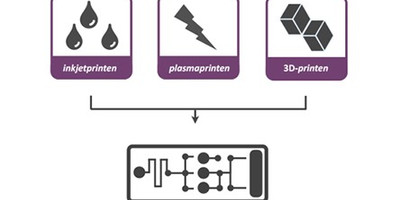‘Point of Care Testing’ (POCT) is technology aimed at taking laboratory grade tests in the direct vicinity of a patient but outside a diagnostic laboratory (e.g. at home or at the GP’s office). POCT offers a lot of advantages: it’s faster, cheaper and opens up the way to tailored therapy. New technological advancements now make it possible to miniaturize these tests and thus create Lab-on-a-Chip systems for POCT-applications.
Although Lab-an-a-Chip systems have been in development for many years now and demand is continually on the rise, new implementations keep lagging far behind. One reason for this is that most of these Lab-on-a-Chip systems require technically complex and highly conditioned production facilities. For this reason a lot of developments don’t reach the mass production stage and makes it financially impossible for smaller companies to further develop and market these new technologies. Printing techniques like inkjet-, plasma- and 3D-printing are existing, flexible and low threshold technologies which could be used to overcome the previously mentioned obstacles in designing and testing new ideas fot Lab-on-a-Chip systems.
In this project we want to show that these printing techniques are pre-eminently applicable for the prototyping of biomedical sensors. To make these sensors even more accessible and flexible we aim to use smartphones for the readout of the sensors. This last goal is made possible by a recent discovery at the Technical University of Eindhoven who are also a partner in this project. The idea is to realize two demonstrators: A first one with the capability to distinguish between pneumonia and a simple cold and a second sensor which can be used in the diagnosis and treatment of cancer.

Saxion is a partner in this project with Fontys as main contact.
runtime: 1st September 2017 - 31st August 2022
Project leader: Rory Dijkink
Project partners: Fontys (main contact), Genmab, InnoPhysics, Meyer Burger, Rijnstate, Surfix, TNO, TU/e
